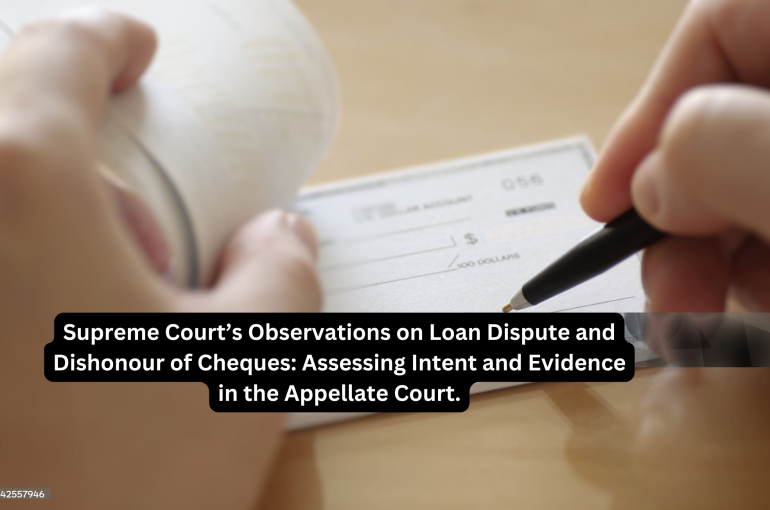SUPREME COURT FINDS ACCUSED GUILTY OF DISHONOUR OF CHEQUES DUE TO HIS CONDUCT
INTRODUCTION
The present matter of Sri Sujies Benefit Funds Limited V M. Jaganathuan, in Criminal Appeal No. 3369 Of 2024 vide Order Dated 13/08/2024 revolves around a dispute concerning a loan transaction and dishonour of cheques. The facts, findings and observations made by the Hon’ble Supreme Court in the present matter are discussed in detail in this article.
FACTS
The Respondent (hereinafter referred to as the Accused) was the subscriber of the Appellant, the Chit-fund Company (hereinafter referred to as the Complainant). The Accused borrowed loan amount of Rs. 21,09,000 from the Complainant over a period of about 2 years, including interest after eight years. The Accused issued a cheque of Rs. 19,00,000. Upon presenting the cheque to the concerned bank, the cheque got returned with the endorsement “Account Closed”. The Complainant issued a statutory notice to the Accused. The Accused repudiated the debt in reply to the notice.
The Complainant then filed a complaint under Section 138 of the Negotiable Instruments Act, 1881, (hereinafter referred to as the N.I. Act), before the Trial Court, Coimbatore. On behalf of the Complainant, the manager of the Chit-fund Company was examined, and nineteen exhibits were marked. There was no witness on behalf of the Accused although 5 witnesses were marked. Upon, perusal of the evidence on record and hearing the submissions of both the parties, the Trial Court convicted the Accused for the offence under Section 138 of the N.I. Act. The Accused was sentenced with 1-year simple imprisonment and was a fine of Rs. 38,00,000 to be paid as compensation to the Complainant.
The Accused then approached the Appellate Court and filed a Criminal Appeal, challenging the conviction and sentence along with a petition under Section 391 (Appellate Court may take further evidence or direct it to be taken) of the Code of Criminal Procedure. The Appellate Court allowed the Petition. The same was challenged by the Complainant before the High Court of Madras. The High Court of Madras negated such challenge and confirmed the Order passed by the Appellate Court to let in additional evidence.
The Accused presented himself as defence witness and submitted thirteen exhibits in order to show that substantial amounts were repaid by him to the Complainant.
The Appellate Court then allowed the Accused’s Appeal and acquitted the Respondent holding that the cheque was not issued towards a legally enforceable liability.
The Appellant then approached the High Court with a Criminal Appeal, impugning the judgement passed by the Appellate Court. The same was dismissed by the High Court. The Appellants then filed a Criminal Appeal at the Supreme Court of India.
ANALYSIS & OBSERVATIONS MADE BY THE HON’BLE SUPREME COURT
The Hon’ble Supreme Court referred to its judgement in Dashrath Rupsingh Rathod v State of Maharashtra, (2014) 9 SCC 129, in which it was held that
“An offence under Section 138 of the Negotiable Instruments Act, 1881 is committed no sooner a cheque drawn by the accused on an account being maintained by him in a bank for discharge of debt/liability is returned unpaid for insufficiency of funds or for the reason that the amount exceeds the arrangement made with the bank.”
…
The Hon’ble Supreme Court, in the present matter, observed that although the Respondent argued before the Trial Court that no loan transaction occurred between the parties, he later submitted additional evidence in the Appellate Court by presenting receipts to demonstrate repayment of the loan. However, the Respondent failed to produce all receipts proving full repayment of the loan, as noted by the Appellate Court. The Respondent’s acquittal was based mainly on the difference in interest rates and the finding that a substantial portion of the loan had been repaid.
As per the findings of the Hon’ble Supreme Court, since the Respondent does not deny that he issued or signed the cheques, it was his responsibility, once he claimed to have repaid the amounts to the Appellant, to either retrieve the cheques or instruct the bank not to honour them. However, the fact that the Respondent closed the bank accounts just a few weeks after issuing the cheques raises significant concerns about his conduct and intentions.
The Hon’ble Court further in its observations stated that the Trial Court had meticulously analysed the issues of the case, whereas the Appellate Court and the High Court of Madras only referred to the scrutiny of the interest amount mentioned on the pro-note and effected in the Statement of Accounts of the Appellant and the evidence produced by the Respondent indicating that some repayments were made. The Hon’ble Supreme Court held it to be erroneous and stated that it cannot be sustained.
The Hon’ble Supreme Court stated that the Respondent being a subscriber to a Chit-fund Company, cannot be considered as a layman. The Respondent is supposed to be aware of the laws. After the issuance of the promissory notes, he cannot take a plea in these collateral proceedings under the N.I. Act to contend that the rate of interest was higher than the permissible rate under the Tamil Nadu Act.
JUDGEMENT
The Hon’ble Court set aside the impugned judgement of the High Court of Madras and the Order of the Appellate Court. The Order of the learned Trial Court was restored with certain alterations. The Respondent was held liable to pay an amount of Rs. 28,50,00 within eight months. In an Affidavit, the Respondent averred that he is 86 years old, and his wife is also advanced in age. Hence, the sentence of simple imprisonment for one year was waived off by the Hon’ble Supreme Court. In case the Respondent failed to make the afore-mentioned payment to the Appellant, then, in that case the sentence of simple life-imprisonment for one year shall stand revived.
Ashita
Associate
The Indian Lawyer & Allied Services.





































Leave a Reply